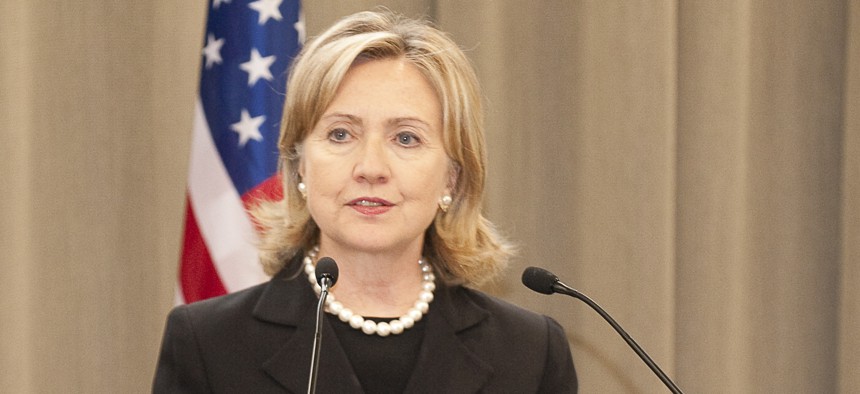
Hillary Clinton on a visit to New Zealand in 2010, during her tenure as secretary of State. U.S. Embassy New Zealand
FBI’s Balancing Act on Clinton Email Decision
Agency recommends against prosecution of presumptive Democratic nominee, while blasting her and the State Department’s handling of classified information.
It’s not surprising that FBI Director James Comey went through a long wind-up before delivering his pitch to the world on Tuesday morning: the announcement that his agency would not recommend criminal charges against presumptive Democratic presidential nominee Hillary Clinton over her use of a private email server as secretary of State.
Comey for months had been insisting that the FBI would take as much time as needed to be thorough in its investigation, despite political pressure from friends and foes of Clinton in this election season that his team fish or cut bait. He was in an unprecedented situation.
Comey’s wind-up Tuesday was not flattering to Clinton or the to the State Department. “Although we did not find clear evidence” of intentional misconduct,” he said, “there is evidence that they were extremely careless in their handling of very sensitive, highly classified information.” The FBI also found no evidence of outsiders breaching Clinton's email, though Comey said investigators concluded “that the security culture of the State Department in general, and with respect to use of unclassified e-mail systems in particular, was generally lacking in the kind of care for classified information found elsewhere in the government.”
The FBI’s review of the text of the 30,000 emails Clinton turned over to the State Department after leaving office found 110 messages in 52 e-mail chains were determined to have contained classified information at the time they were sent or received. “Eight of those chains contained information that was Top Secret at the time they were sent, 36 chains contained Secret information at the time and eight contained confidential information,” Comey said.
The FBI forensics team appears to have for more thorough than Clinton’s own team or even the State Department inspector general, whose scathing report in May also found laxness with respect to security and records management obligations at the department under Clinton. Comey faulted the private server arrangement reportedly set up by temporary State information technology specialist Bryan Pagliano.
“When one of Secretary Clinton’s original personal servers was decommissioned in 2013, the e-mail software was removed, Comey said. “Doing that didn’t remove the e-mail content, but it was like removing the frame from a huge finished jigsaw puzzle and dumping the pieces on the floor. The effect was that millions of e-mail fragments end up unsorted in the server’s unused – or “slack” – space.”
Comey noted that seven of Clinton’s e-mail chains concerned matters classified at the Top Secret/Special Access Program level when they were sent and received. “There is evidence to support a conclusion that any reasonable person in Secretary Clinton’s position, or in the position of those government employees with whom she was corresponding about these matters, should have known that an unclassified system was no place for that conversation,” he said.
Anticipating continuing political crossfire, Comey declared that there were “no outside influences” on the FBI’s cyber investigators. Then at the end of his televised 10-minute presser at FBI headquarters, he delivered the verdict Clinton’s supporters and detractors have been awaiting for a year:
“Although there is evidence of potential violations of the statutes regarding the handling of classified information, our judgment is that no reasonable prosecutor would bring such a case.”
Critics will doubtless note that the FBI’s announcement comes within a week after a dustup over Bill Clinton’s airport tarmac meeting with Attorney General Loretta Lynch and just three days after the FBI interviewed Clinton herself for three and a half hours.
But Comey’s description of the FBI’s thousands of hours of work showed that the agency’s employees did exhaustive research – apparently sufficient to allow an announcement before the summer’s national party conventions. Lynch already has declared she will accept the final decision from Justice Department’s career prosecutors.
Some on the political right have long predicted agencies under the Obama administration would let a former Cabinet member off the hook. Presumptive Republican nominee Donald Trump had said it is “impossible for the FBI not to recommend criminal charges against Hillary Clinton” given the evidence against her, but at the same time predicted she would not be prosecuted. So the political debate over the email issue is likely to persist through the November elections.
The FBI’s balancing act is likely not over.
Photo: U.S. Embassy New Zealand, via Flickr







